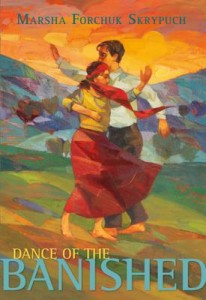I’ve been a devoted Marsha Skrypuch fan for years (in a Healthy, Well-Adjusted Adult Fan kind of way, not in a Perhaps It’s Time For a Restraining Order kind of way). My post about her athletic prowess—The Day Marsha Skrypuch Whipped My Butt—will give you some hint as to my level of admiration for this woman.
Marsha writes historical fiction—books that I love to read, but if I actually tried to write one I’d turn into a raging alcoholic within 48 hours of starting the literature search. And I should stress that Marsha’s books aren’t just good—they’re award-winningly good. She’s received over 50 awards and nominations for her work, including two Ontario Silver Birch Awards. Her 19th book, Dance of the Banished, will be published in August.
Marsha—who appears to have found some way to clone herself—also teaches at the Humber School for Writers, runs book camps, and oversees an online critique group for writers. I’ve also discovered that if you throw yourself at her feet, look pathetic and whine like a baby, she’ll offer you extremely valuable—yet completely free—writing advice to post on your blog. Here’s what she gave me to share with you. I wouldn’t do this for just anybody, you know. You’re welcome.
Ten Tips For Writing That First Novel
by Marsha Skrypuch
Tip #1: Read A LOT
Like a thousand novels or more. You’d be amazed at the number of people who want to be a novelist but hate reading. Being a voracious reader is the single most important attribute of successful novelists.
Tip #2: Write every day for at least ten minutes
“When I retire, I’m going to be a novelist.” Just like you can’t suddenly run a marathon, you can’t suddenly write a novel. Muscles need to be trained for both activities and that’s where the ten minutes comes in. Give yourself ten minutes each day even if you have no idea what you’re going to write. Give yourself ten minutes a day even if those ten minutes are the commercial breaks for So You Think You Can Dance.
The first few days that you’re confronted with your ten minutes, you’ll probably stare at a blank screen (or page) and sweat. But after a while, you’ll develop writerly habits. You’ll eavesdrop on the next table at lunch, not for the gossip, but for the nuance of speech. When you read the paper, your mind will spin with story potential from the various little tidbits. Your mind will wander with story ideas on the way to work and you may even end up missing your stop. As this begins to happen, you’ll barely be able to contain yourself until you get to your precious ten minutes. Once you’ve been writing enthusiastically for about a month solid during your ten minutes a day, you’re ready to start on your novel.
Tip #3: Ask yourself, “What would happen if…”
This is the beginning of a novel. As an example, my WWII trilogy
Stolen Child/Making Bombs for Hitler/Underground Soldier
all started with this question: “What would happen if two sisters were kidnapped together by the Nazis in WWII yet both suffered completely different fates?”
Tip #4: Brainstorm your characters
Once you’re brainstormed your core story question, you need to brainstorm your characters. For each key character, sketch out this:
*What/whom does my character want? Love? Need? Be very specific.
*What quirks and habits does my character have?
*What could get in the way of them achieving their wants/loves/needs? Think of the interaction of characters and how if one person gets their goal, someone else won’t get theirs.
Tip #5: Go to McDonalds or Starbucks
Not to eat—to grab a job application form. Make copies. Fill one out for each of your characters.
Tip #6: Take your character through a 24 hour day
Begin at dawn. Be careful to note each action, and also the physical space, right down to what their sleeping area looks like and what they break their fast with. Depending on whether they’re in a space ship or medieval England it will all be very specific to your story. You’ll be amazed at how much you learn about your character by following them for 24 hours. And if you listen closely, you’ll find out what your story is really about.
Tip #7: Don’t try to write your story in chronological order
Is there a scene vivid in your mind but you don’t know the before or after? Awesome! Write it. Keep on writing these scenes that are vivid. Once you have a critical mass of them, you’ll see that they practically self-organize, sort of like how raindrops form a puddle.
Tip # 8: Take breaks
Once you’re plunged into your story, you’ll be writing far more than ten minutes a day, but stop writing before your brain is completely empty of story. Stop partway through a paragraph, even partway through a sentence, and go out and do something physical. Everyone has their own creativity limit. For me, it’s three hours. Anything written beyond the three hours a day is trash.
Tip #9: Do Kamikaze research
In other words, write what you can while in the heat of it, leaving blanks and XXXs for spots that you’ll fill in later. Do research as you need to after you’ve done your daily writing but don’t use research as an excuse not to write.
Tip #10: Let yourself write crap
One of the best revision methods is to delete the first 25% of your first draft. Now that you know this, don’t angst over every word. You’re going to revise, delete rejig down the line, but right now you’ve got to get the story down in first draft.





I am a Marsha fan too and have often wondered how she does it all, and always with a smile. I suspect you’re right about the clone.
I bet she’ll deny the clone (while simultaneously completing her next book and organizing another workshop for writers… 🙂
Thrilled to see this post and be introduced to another great author! And thanks for the writing tips. Though I can’t even imagine writing fiction, writing non-fiction lives by these same simple rules. But then, a writer isn’t necessarily and author; my DH makes me an author by taking all my crazy scraps and putting them in some cohesive order!!! So another tip: marry a good editor!!
Thanks again!
Ha! Good advice Gretta! A friend of mine recommends marrying a good lawyer (he did – and it’s saved him a fair bit of money over the last 30 years). Perhaps the ideal spouse is a lawyer who moonlights as an editor 🙂
Brenda, thank you for posting this! I must point out that I am ever in awe of all that you accomplish in a day. You also happen to give the BEST how-to-write-for-magazines workshop in the world!!!
Wow! Thank you so much, Marsha!